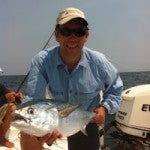By Jack Sterne, Director of Strategic Initiatives
Anyone who’s enjoyed fishing in the Gulf of Mexico can share a story about how great the fishing is around an oil rig. Fish love structure, and I know my fishing is always better around these types of hot spots. A downed tree, a dock, a live reef, or an artificial reef – all of these places typically produce great fishing and any fisherman worth his or her salt knows to target them.
That’s why it’s so disconcerting to the Gulf’s recreational fishermen that the Department of Interior has announced its intention to begin enforcing a long-dormant policy requiring the removal of non-producing drilling rigs in the Gulf. Requiring the blanket removal of these rigs threatens to rob the Gulf of some of its favorite fishing spots. In addition, under a balanced management plan, providing for fishing access and designed for population productivity, the non-producing rigs may be useful in enhancing fish stocks in places where habitat is limiting.
Given these facts, the Department of Interior should halt its plan for blanket removal of these rigs. Recent legislation (S. 1555) introduced by Sen. David Vitter of Louisiana would help modify the policy requiring rig removal and create a “Reef Maintenance Fund” that would finance the maintenance of the artificial reefs created by decommissioned rigs. Rig owners would be required to contribute approximately half of the cost they would have incurred in removing the rig had they chosen not to participate in the program.
This “Reef Maintenance Fund” could be expanded to include funding for other habitat projects that could increase fish populations and fishing opportunities beyond the immediate vicinity of the rigs. Specifically, it could fund efforts to restore nearshore habitat affected by the Deep Water Horizon oil spill or fund improved science on reefs and fish habitats in the Gulf of Mexico.
Under Sen. Vitter’s legislation and a similar bill (H.R. 3429) filed by Rep. Steven Palazzo of Mississippi, the artificial reef program would require a determination by the Secretary of Interior as to whether any coral or fish species have colonized the structure prior to deciding on requiring the removal of the rig. If there is a substantial reef ecosystem in the vicinity of the rig, the platform cannot be removed until the Secretary determines that removal would not harm the reef ecosystem.
We think this approach is far more sensible than the immediate removal currently being pursued by the Federal government. It would be a better response to the damage done by the spill than ordering the blanket removal of all the rigs, regardless of their value as fish habitat. We need to pursue these types of responsible approaches as we work to learn more about the value of artificial reefs in the Gulf.
In this regard, the Gulf of Mexico Fishery Management Council has initiated a plan amendment to evaluate the appropriateness of designating fixed petroleum platforms and artificial reefs as “essential fish habitat.” The Council’s staff will begin developing alternatives that include such structures to be recognized as habitat areas of particular concern.
Despite this step, the legislation being proposed by Sen. Vitter and Rep. Palazzo is still necessary in order to stop the Department of Interior’s effort and we support their proposals. We will be working to make sure they become law and urge our partners in the Gulf of Mexico to do the same.










